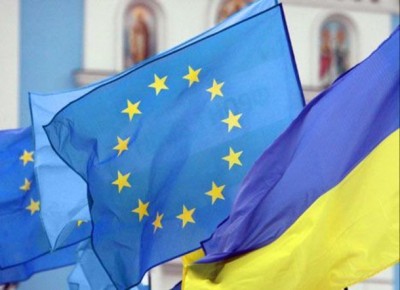Ukraine: The Untold Story – Far-Right Connections of Pro-EU Faction

Ukraine’s refusal to sign an EU association agreement, the ensuing protests and the attempt to oust the government in a failed no-confidence vote all have their origins in a grand geopolitical battle being waged between Germany and Russia.
Germany is using the European Union to bring pressure to bear to integrate Ukraine into Berlin’s political and economic sphere.
However Germany’s expansion project was brought to a halt at the EU’s eastern partnership summit in Vilnius.
Only two countries, Georgia and Moldova, signed EU association agreements, while Belarus and Armenia preferred to join the Eurasian Customs Union with Russia.
Moscow had brought its own pressure to bear on Kiev, including trade sanctions and other threats in order to keep Ukraine out of Berlin’s new drive to the east.
Yet Germany has continued its efforts to break Ukraine out of the Russian sphere and the German media now speaks of the “battle for the Ukraine” and a “new iron curtain” to be vanquished in the east.
The EU has also warned Ukraine that it faces a financial blockade if it continues to refuse to sign.
Berlin’s puppet EU foreign relations chief Catherine Ashton even blasted Ukraine for not “becoming a predictable and reliable interlocutor for international markets.”
The IMF has already suspended a credit line worth $15 billion in 2011 because Ukraine refused to stop subsidising household gas bills.
The EU treaty would also allow European monopolies to grab Ukraine’s crucial energy markets.
German companies are already supplying the country with natural gas via pipelines through Poland and Hungary and via Slovakian pipelines by next year, breaking Ukraine’s dependence on Russian gas.
German foreign policy group, the German Council on Foreign Relations (DGAP), openly discusses how association agreements must be implemented under “supervision” and calls for “stringent and very painful social adjustment measures.”
To understand what that means look at the strict bailout requirements being inflicted on eurozone inmates Greece, Portugal, Cyprus and other member states.
In the long run the DGAP foresees integrating even Russia into the EU treaty system of unbridled corporate dictatorship under the hegemony of Berlin, opening up German companies to economic expansion all the way to the Pacific.
So Ukraine’s refusal to sign the EU’s association agreement has spoiled some very big Teutonic imperialist plans.
This would explain the narrative in the Western media backing protests in the Ukraine by a “pro-European” alliance.
So who are these “pro-democracy” campaigners that can’t unseat the government made up of president Viktor Yanukovych’s Party of the Regions and supported by the Communist Party of Ukraine?
Bluntly it is an unholy alliance of conservatives, fascists and revanchist groups promoting a cult around former nazi collaborators.
This cult focuses particularly on Stepan Bandera, leader of the Organisation of Ukrainian Nationalists (OUN), which joined forces with the nazis during the invasion of the Soviet Union in June 1941.
Over the last 20 year numerous monuments to Bandera have been erected, particularly in west Ukraine, including a statue in the city of Lviv, site of one of the largest anti-Jewish pogroms.
Following the 2004 Orange revolution in Ukraine, incoming president Viktor Yushchenko of the Our Ukraine Party officially declared Bandera and fellow nazi Roman Shukhevych “heroes of the Ukraine.”
A prominent party which promotes this cult is the All-Ukrainian Union “Svoboda” (freedom) party, led by one Oleh Tiahnybok who made a speech at the grave of another Ukrainian nazi recently, ranting against the “Jewish mafia in Moscow.”
This party achieved its political breakthrough 2009, when it was elected to the West Ukrainian Oblast Ternopil (parliament) with 35 per cent of the votes, taking 50 of the 120 seats in the legislature – and its power is growing.
Svoboda is involved in the extreme right-wing Alliance of European National Movements (AENM) umbrella organisation. Among the members are the neofascist Hungarian party Jobbik (the Movement for a Better Hungary) and France’s Front National. British National Party leader Nick Griffin is AENM vice-president.
It has also been seeking closer ties to the neofascist Forza Nuova in Italy and even the far-right German National Democratic Party.
Svoboda is directly drawing on the tradition of nazi collaborators who carried out numerous massacres in the occupied Soviet Union, yet Berlin has remained silent.
The pro-German “Batkivschyna” (Fatherland) party of Yulia Tymoshenko, imprisoned for fraud and embezzlement, entered an electoral alliance with Svoboda in the run-up to the last elections.
This enabled Svoboda to win 10.4 per cent of the vote, gaining 37 MPs in the Verkhovna Rada parliament.
To complete this anti-Russian alliance is Vitaly Klitschko’s UDAR party, an acronym which charmingly translates as “punch.”
Klitschko is a world heavyweight boxing champion and national hero who has put his name forward to stand in the 2015 presidential elections.
However he may not be eligible to stand as he lives mostly in Germany.
The German Christian Democrat Union party openly admits that its Konrad Adenauer Foundation “assigned” Klitschko the task of establishing a right-wing party in the Ukraine in order to create a permanent pro-EU majority in Kiev.
During a foundation event with Klitschko in Brussels, German CDU MEP Elmar Brok spoke frankly about why Berlin has such strong interest in Ukraine.
After all, it is “a country with great economic possibilities,” with “a well-educated population” and with “good agricultural prerequisites.”
It is no wonder that Germany wants to push for the militarisation of Europe at the EU summit planned for later this month.

